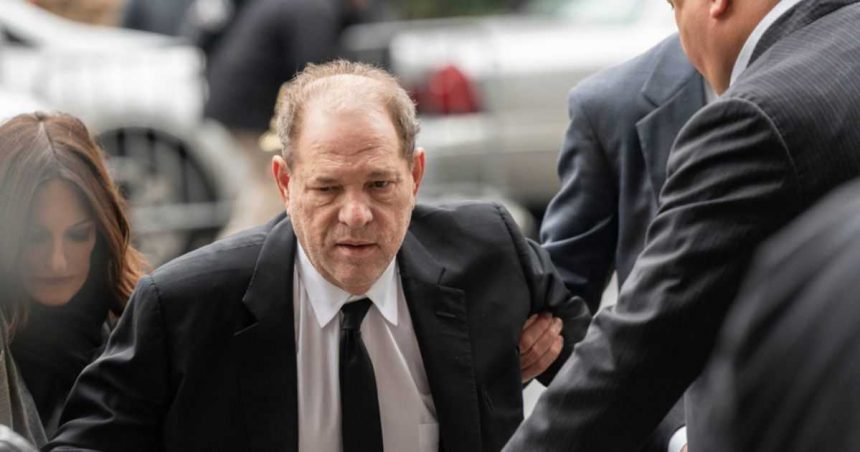In a stunning turn of events, a recent ruling by New York’s highest court has thrust one of the most scrutinized legal battles back into the spotlight. The 4-3 decision has reversed a landmark verdict from 2020, unraveling the case of Harvey Weinstein and sending shockwaves through the realms of justice and public discourse.
The courtroom drama that once captivated global attention now unfolds with renewed vigor. Weinstein’s fall from grace, once seen as a triumph for survivors of assault and misconduct, now faces a turbulent twist, prompting a reexamination of not just the specific case, but also the broader societal response to allegations of abuse and misconduct in positions of power.
As we delve into the complexities of this legal saga, it becomes clear that the implications reach beyond the confines of a courtroom. The #MeToo movement, born from a groundswell of courage and solidarity, now stands at a critical juncture, grappling with the intricacies of justice, due process, and the enduring impact of assault culture.
Join us as we navigate the nuances of the Weinstein case, exploring the consequences of the court’s ruling, reflecting on the evolving landscape of assault allegations, and charting a course forward in pursuit of accountability and healing.
The Court’s Decision
The recent decision by New York’s highest court to overturn Harvey Weinstein’s 2020 rape conviction has reverberated throughout legal circles. The court’s ruling, by a narrow 4-3 margin, cited “egregious” errors in the trial proceedings as grounds for the reversal. Key to this decision was the admission of testimony about uncharged, alleged prior acts, which the majority deemed prejudicial to Weinstein’s case.
The crux of the court’s argument centered on ensuring fair trial procedures. It stressed the importance of avoiding undue prejudice and ensuring that defendants are judged solely on the charges brought against them. With the admission of testimony beyond the specified charges, the court concluded that Weinstein was unfairly prejudiced, warranting a new trial.
This decision not only signifies a significant legal development but also reignites debates surrounding the #MeToo movement and broader conversations about assault and misconduct. It raises questions about balancing justice for survivors with the rights of the accused, shedding light on the complexities of navigating misconduct allegations in high-profile cases.
Weinstein’s legal team lauded the decision as a win for due process and defendants’ rights. Conversely, advocates for survivors expressed concerns, fearing that the ruling could discourage others from sharing their stories. The dissent within the court underscores the divisive nature of the case, reflecting ongoing tensions between competing interests of justice, fairness, and accountability. As the legal saga of Harvey Weinstein continues to evolve, this decision serves as a pivotal moment, prompting contemplation of the intricacies of the judicial system and the lasting impact of the #MeToo movement.
Reopening Old Wounds
The aftermath of the court’s decision to reverse Harvey Weinstein’s rape conviction has reignited painful memories for both Weinstein’s accusers and supporters of the #MeToo movement. For those who courageously stepped forward to share their experiences, the prospect of enduring another trial evokes a daunting wave of emotions.
Weinstein’s accusers, who already endured the challenging process of recounting their experiences in court, now face the potential of reliving their trauma once again. The toll of testifying, of exposing their most vulnerable moments to a scrutinizing audience, cannot be underestimated. The possibility of going through this ordeal anew serves as a harsh reminder of the enduring effects of assault and misconduct.
Moreover, the court’s decision reignites broader discussions about justice and accountability. For many survivors, Weinstein’s trial symbolized a pivotal moment, a victory in the fight against impunity for perpetrators of assault. However, the reversal of his conviction threatens to undermine progress made, casting doubt on the effectiveness of legal mechanisms in addressing systemic issues of power and abuse.
In the wake of the ruling, advocates for survivors have voiced apprehensions, highlighting the potential chilling effect it may have on future cases. The fear of not being believed, of facing pushback and scrutiny, looms large for survivors considering sharing their own stories. The decision to seek justice is fraught with uncertainty, compounded by the understanding that the legal system may not always provide the closure and validation survivors seek.
As we grapple with the repercussions of Weinstein’s case, it becomes apparent that the pursuit of justice is an ongoing journey, one that demands unwavering dedication and solidarity. Despite setbacks, the voices of survivors remain resilient, their stories standing as a testament to the power of speaking truth to power. In the face of adversity, they persist in advocating for change, pushing forward in the quest for a more just and equitable society.
Legal Perspectives
In the aftermath of the court’s decision to overturn Harvey Weinstein’s rape conviction, legal experts and scholars offer contrasting viewpoints, underscoring the complexities inherent in navigating cases of assault and misconduct within the legal system.
The majority opinion of the court emphasized the significance of upholding fair trial procedures and safeguarding defendants’ rights. Central to their decision was the belief that allowing testimony about uncharged, alleged prior acts unfairly prejudiced Weinstein’s case. By prioritizing due process, the majority stressed the necessity of impartiality and objectivity in adjudicating misconduct allegations.
Conversely, dissenting judges argued that the majority’s decision failed to adequately consider the broader context of Weinstein’s behavior. They argued that the testimony about uncharged acts was relevant in establishing a pattern of behavior and revealing Weinstein’s modus operandi. Furthermore, they cautioned against perpetuating antiquated views of assault and rape, emphasizing the importance of contextualizing survivors’ experiences within a comprehensive framework of justice.
The court’s ruling holds far-reaching implications for future cases involving assault allegations. It raises questions about the admissibility of evidence and the extent to which past conduct can factor into assessments of credibility and culpability. As legal scholars grapple with these questions, the broader discourse on assault continues to evolve, prompting contemplation on the role of the judicial system in addressing systemic issues of power and abuse.
In navigating the complexities of Weinstein’s case, legal experts provide invaluable insights into the intricacies of the law and the hurdles inherent in adjudicating allegations of assault and misconduct. Their perspectives emphasize the need for ongoing dialogue and engagement as we collectively strive towards a fairer and more just legal system.
Reflections on the #MeToo Movement
The reversal of Harvey Weinstein’s rape conviction prompts deep reflections on the broader impact of the #MeToo movement, reshaping societal perspectives on assault and harassment and sparking vital conversations about power, accountability, and justice.
Shifting Cultural Paradigms
Weinstein’s trial acted as a catalyst for the #MeToo movement, empowering survivors to come forward with their stories and holding influential figures accountable for their actions. The movement’s surge highlighted the widespread nature of assault and rape across various industries, emphasizing the urgent need for systemic change. What commenced as allegations against Weinstein swiftly evolved into a global reckoning, uncovering the prevalence of assault and rape in industries like Hollywood. The bravery of survivors who shared their stories laid bare the deep-seated power imbalances that enable abuse and exploitation to persist unchecked.
Empowering Survivors
At the heart of the #MeToo movement lies the empowerment of survivors, affording them a platform to share their experiences and demand accountability. Weinstein’s conviction was celebrated as a significant milestone, offering validation and closure to survivors who had long been silenced and marginalized. The trial sent a resounding message to survivors everywhere, assuring them that their voices held weight and that perpetrators of assault and rape would face consequences for their actions. It marked a triumph for those who had bravely spoken out, representing a noteworthy stride towards dismantling the culture of silence and impunity that has shielded abusers.
Challenges and Controversies
Yet, Weinstein’s case also shed light on the challenges and controversies entwined in prosecuting cases of assault and misconduct. From legal obstacles to societal biases, survivors often encounter numerous obstacles in seeking justice, underscoring the need for comprehensive reforms within the legal system and broader societal frameworks. The trial sparked debates on burdens of proof, reliability of witness accounts, and the media’s role in shaping public opinions…






